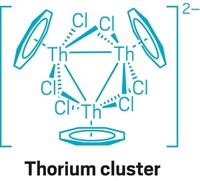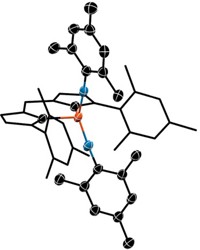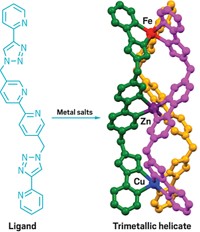Advertisement
Grab your lab coat. Let's get started
Welcome!
Welcome!
Create an account below to get 6 C&EN articles per month, receive newsletters and more - all free.
It seems this is your first time logging in online. Please enter the following information to continue.
As an ACS member you automatically get access to this site. All we need is few more details to create your reading experience.
Not you? Sign in with a different account.
Not you? Sign in with a different account.
ERROR 1
ERROR 1
ERROR 2
ERROR 2
ERROR 2
ERROR 2
ERROR 2
Password and Confirm password must match.
If you have an ACS member number, please enter it here so we can link this account to your membership. (optional)
ERROR 2
ACS values your privacy. By submitting your information, you are gaining access to C&EN and subscribing to our weekly newsletter. We use the information you provide to make your reading experience better, and we will never sell your data to third party members.
Synthesis
Iron + Vanadium Share A Magnetic Moment
Inorganic Chemistry: Partial nitrogen-atom transfer provides a new synthetic tool for making single-molecule magnets
by Stephen K. Ritter
September 21, 2015
| A version of this story appeared in
Volume 93, Issue 37
Chemists studying an iron nitride complex known for its ability to transfer nitrogen atoms to organic substrates have discovered that the complex can also be used to partially transfer nitrogen to another metal complex. Besides adding a new dimension to metal nitride chemistry, the resulting nitride-bridged bimetallic complex can function as a single-molecule magnet (Inorg. Chem. 2015, DOI: 10.1021/acs.inorgchem.5b01455). Single-molecule magnets, or SMMs, are paramagnetic species that retain their magnetization after being exposed to an applied magnetic field. Although SMMs are stand-alone molecules, they behave like classical bulk magnets. Scientists are interested in SMMs for high-density information storage and quantum computing applications. The researchers led by Jeremy M. Smith of Indiana University and Rodolphe Clérac of the National Center for Scientific Research’s Paul Pascal Research Center at the University of Bordeaux, in France, made the new SMM (shown) by combining an iron(IV) tris(carbene)borate nitride complex with a vanadium(III) mesityl complex. Structural analysis and X-ray photoelectron spectroscopy revealed that the partial transfer reaction is a two-electron process resulting in nitrogen bridging iron(II) and vanadium(V) ions.





Join the conversation
Contact the reporter
Submit a Letter to the Editor for publication
Engage with us on Twitter